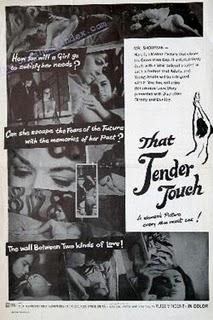That Tender Touch

I once read that it was possible to become mesmerized by bad acting. I never realized how true that was until I sat through Russel Vincent’s 1969 “dykesploitation” classic, That Tender Touch. Actually “bad acting” is too strong a term. “Campy” and “overblown” are much more accurate.
The story starts with fresh-faced Terry (Sue Bernard) getting date raped. She confides in her older roommate, Marsha (Bee Tompkins), who spends the next few weeks consoling her. Predictably, Terry begins to develop erotic feelings for the matronly widow. The sexual tension between the two women culminates in a side-splittingly funny dream sequence in which Terry, having an intense erotic dream, writhes and hyperventilates, eerie voice-over included.
It is at this point that I begin to believe that this movie was nothing more than Russel Vincent’s flimsy excuse to film two attractive females groping each other — the stuff of many straight men’s sexual fantasies. And the ominous swell of the music during the love scene, and Terry’s feelings of shame the morning after, bespeak an underlying homophobia on Vincent’s part.
What happens next is also a slap at lesbianism. Terry meets Ken, a doppelganger for the doll of the same name. Ken shows her that all men aren’t assholes (of course). He falls madly in love with Terry. He asks Terry to marry him (of course) without being aware of the nature of Terry’s and Marsha’s relationship (of course) and believing Terry to be a virgin (of course). Terry confesses to Marsha, who has become increasingly suspicious of Ken (of course), and reminds Terry of her previous vow to live man-free (of course). Terry accepts Ken’s proposal and runs off to suburbia, leaving Marsha broken-hearted (of course).
When Marsha appears on Terry’s doorstep, Terry squirms like any self-respecting, self-hating lesbian. She sternly warns Marsha to forget about the relationship and never to tell her dum-dum of a husband about it... then offers to put Marsha up for a few days.
I could go on with a plot synopsis, but why bother? There was more gratuitous T&A, more late '60s bouffants, more histrionics and more sly homophobia. And the suicide lacked a much-needed emotional power due to its implausibility. (Hello!!! When sober grown-ups throw themselves into swimming pools, they usually float, not drown.)
If you want to spend eighty minutes of your life giggling at melodrama, mentally re-writing stilted dialogue or getting a taste of how the lesbian lifestyle was depicted in Hollywood during the 1960s, The Tender Touch is the movie for you.